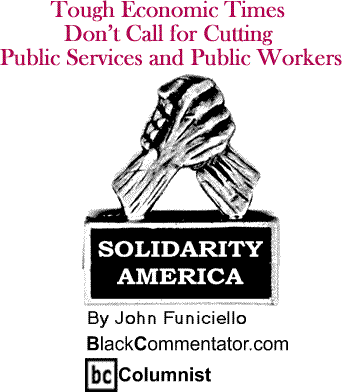
|
||||||||||||||||||||||
|
||||
 |
||||
Most people agree that times are tough. Since the bailouts, times are not as tough for the banks, the stock market, the insurance companies, and the corporations that take our money and our jobs to other countries.
The people who are left out are beginning to become more anxious every day, but they don�t seem to be able to find a solution, because the one (ultimate) remedy is economic change through the political system. But, they have lost faith in the political system. All they see is corrupt behavior at the national and state levels. Good ideas in Congress and the state legislatures are crushed in the rage to maintain the status quo, because the status quo keeps the money flowing into the coffers of the political class. It�s working fine for them and the corporations that keep them in line with their �contributions� consider it a small price to pay as the cost of doing business - they pay mere thousands to politicians and make profits in the billions. Republicans like to describe Democrats as �tax and spend liberals,� while in recent years, the GOP, itself, has become �borrow and spend� makers of war. Generally, the Democrats have been more inclined to spend on social and human services programs - although they do pretty well in the war department, too - and Republicans prefer to cut taxes for the rich and the corporations and plan the next war.
�Free
trade,� wars, loss of the The idea that college graduates might not make it to the standard of living as their parents who had lifelong blue collar jobs is enough cause for concern, and people are concerned. The money just keeps flowing out, from families and their communities. Several states are in trouble, in default. They can�t pay their bills. Local officials are worried about running the water plant, fixing the roads and bridges, keeping the sewage treatment plant in operation, maintaining the schools, taking care of children and families in need, and doing all of the thousands of other things local government does every day to see that lives are lived with the least amount of disruption and dangerous outcomes. The cost of labor in governmental budgets is usually the largest item. When financial assistance from the federal and state governments diminishes, the place they go to get the money for local government to operate is the property tax. Or the sales tax, which is one of the most regressive taxes, hurting the low-wage workers and the poor hardest.
Rising unemployment and the loss of tens of millions of jobs over 30 years has devastated the ability to use property taxes to raise money for local budgets, but the answer is not to attack the living standards of workers who provide the services. Yet, already, local governments are demanding givebacks and getting the people ready to reduce the number of local workers and to live with reduced services. Rarely is there ever a discussion at a local government meeting - urban, rural, or suburban - about the devolution of responsibility for funding domestic programs, from the federal and state governments, to the local governments. Only
occasionally is there a discussion about the cost of war and the
cost of the military (the There
is no rational discussion of these issues because politicians don�t
want to do anything to shake up their ordered lives, and the �free
press� in But
local government is not the private sector and it can not effectively
go bankrupt. Services still need to be provided and the most efficiently
delivered services are provided by the workers directly employed
by government. They literally keep If
the federal and state governments are going to expect local governments
to continue to exist, they have to find ways to fund the work they
do, without the credit-card-type borrowing from future generations
and from The impulse to convert our national treasure into profits for the military-defense industries of Corporate America needs to be curbed. We won�t be able to curb that impulse - and we won�t be able to pay for vital public services - until there is broad and open debate about our national priorities, from the town hall, down to the legislatures and the Congress. BlackCommentator.com Columnist, John Funiciello, is a labor organizer and former union organizer.
His union work started when he became a local president of The Newspaper
Guild in the early 1970s. He was a reporter for 14 years for newspapers
in |
||||
 |
||||
If you would like to comment on this article, please do so below. There is a 400 character limit. You do not need a FaceBook account. Your comment will be posted here on BC instantly. Thanks. Entering your email address is not mandatory. You may also choose to enter only your first name and your location.
|
||||
Thank you very much for your readership. |
||||
| Any BlackCommentator.com article may be re-printed so long as it is re-printed in its entirety and full credit given to the author and www.BlackCommentator.com. If the re-print is on the Internet we additionally request a link back to the original piece on our Website. | ||||
| |
||||
| December 10 , 2009 Issue 354 |
| Executive Editor: Bill Fletcher, Jr. |
| Managing Editor: Nancy Littlefield |
| Publisher: Peter Gamble |
| Est. April 5, 2002 |
| Printer Friendly Version in resizeable plain text format |
 |
 |

|
 |
| |
| |

































 America
America War
and military spending has a profound effect on the taxpayers at
every level of government, from towns, villages, small cities, counties,
and thousands of school districts across the
War
and military spending has a profound effect on the taxpayers at
every level of government, from towns, villages, small cities, counties,
and thousands of school districts across the 











